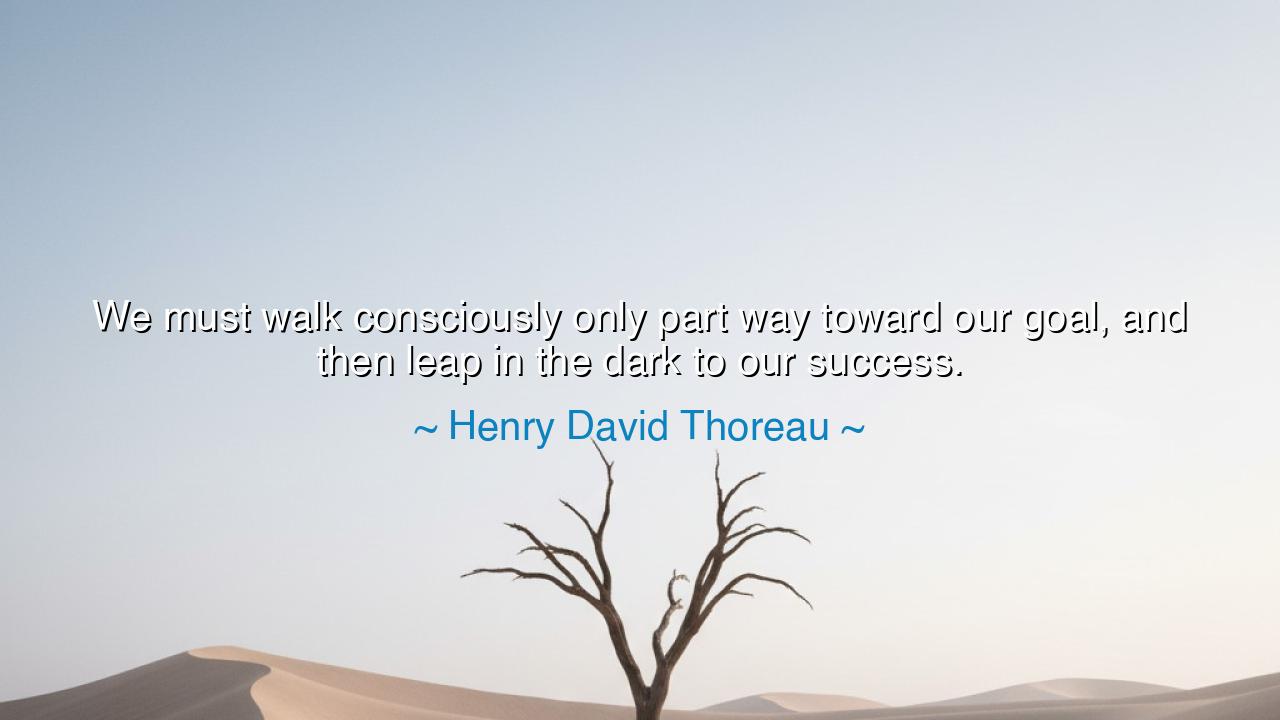
We must walk consciously only part way toward our goal, and then
We must walk consciously only part way toward our goal, and then leap in the dark to our success.






Hear the immortal wisdom of Henry David Thoreau, prophet of Walden and seeker of truth, who proclaimed: “We must walk consciously only part way toward our goal, and then leap in the dark to our success.” In these words lies a teaching fierce and humbling: that reason, planning, and discipline can carry us only so far, but beyond that point lies a chasm that must be crossed with faith. Man cannot see every step of the path to destiny. He must walk with wisdom, then dare the leap that no calculation can prepare him for.
The goal is the shining star toward which the soul moves. Thoreau counsels that we must approach it with clear mind, deliberate action, and conscious intent. To wander blindly in life is folly. But he warns us equally that the path will never be fully illuminated. No man, however wise, can predict the winds of fate or the hidden turns of the journey. There will come a moment when planning ends, and courage must begin. That is the moment of the dark, where vision fails and trust in the unseen must guide the step.
This paradox is written upon the lives of heroes. Consider Christopher Columbus, who sailed west not knowing what lay across the ocean. His knowledge carried him only part of the way—the rest was faith in a world uncharted. Or think of the Wright brothers, who tested wings built by reason and skill, but in the end had to throw themselves into the air, uncertain if they would soar or shatter. These are the embodiments of Thoreau’s vision: reason brings us to the edge, but it is the leap in the dark that births history.
Thoreau himself lived by this creed. He withdrew to Walden Pond, not with a perfect plan of what he would find, but with a daring faith that by stripping away the noise of society he might discover life’s essence. He did not know if his experiment would end in wisdom or in folly. He leapt, and in that leap he found truths that still stir the human spirit. His life teaches us that sometimes we must dare what logic cannot justify, if only to live authentically and deeply.
The dark that he speaks of is not merely ignorance—it is the mystery of life itself. No man can know what lies beyond the next breath, the next choice, the next leap. To live is to accept that uncertainty. The coward demands to see the entire path before moving; the brave accept that no such light exists. The true seeker of success understands that the greatest doors open only when one dares to enter the unknown.
The deeper wisdom is this: if you wait for certainty, you will wait forever. The river of life never clears fully; it is always murky, always flowing. To cross, you must step in, though you cannot see the bottom. To love, to create, to dream, to lead—each of these is such a leap. If you demand guarantees, you will never taste the fullness of existence. But if you leap, even trembling, you may find that the very darkness carries you to your success.
So, O children of tomorrow, take Thoreau’s teaching into your hearts. Walk consciously: plan, prepare, discipline your mind and sharpen your tools. But when you reach the edge where vision fails, do not retreat. Gather your courage, fix your eyes on the unseen, and make the leap in the dark. For it is only in that leap that greatness is found, and only in that daring that the gods themselves will meet you and lift you to your destined goal.






AAdministratorAdministrator
Welcome, honored guests. Please leave a comment, we will respond soon